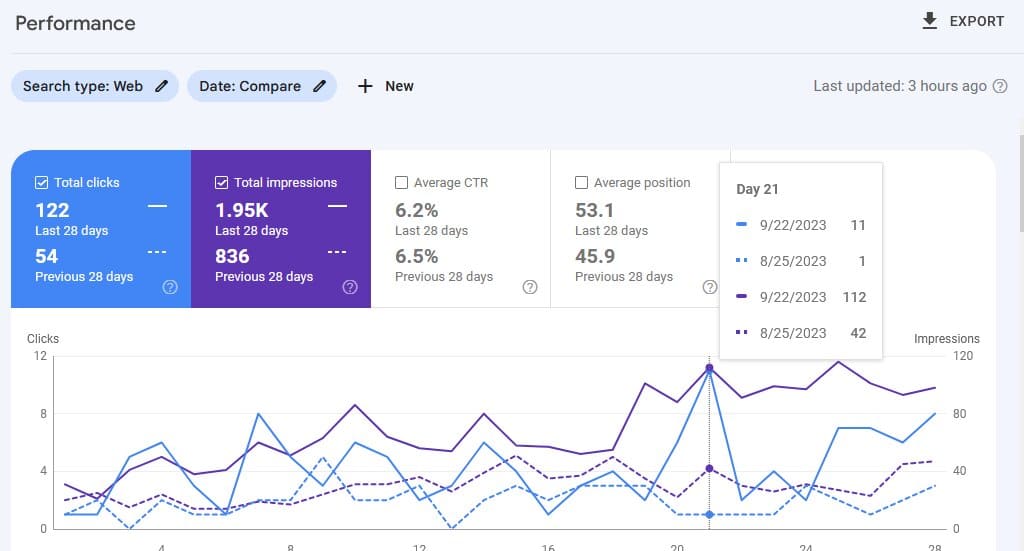
If you have just discovered that SEO in digital marketing is the best low-cost, long-term marketing strategy and want to know how long it takes for SEO to show results, or how long it will take, you should first try to understand how SEO works and what factors influence rankings the most.
Before we discuss the factors that influence rankings the most, let me tell you the average time you can expect for SEO to show results.
On average, SEO takes about 6 months to show any results.
However, to be frank, this figure can vary significantly depending on your specific situation.
Here’s why:
The primary goal of any search engine is to provide the best content to its users. But if you have one hundred pages on the same topic targeting the same keyword, how would they rank?
Certainly, you have to select the best one among all those to place at the top, and similarly, you rank all those pages accordingly.
Now, if someone else targets the same topic, where would you want to place that page?
Certainly, the new writer has to compete with all those pages that were already written and then secure top positions.
Now, here’s another scenario:
You’ve realized that Google sees 15% brand new searches every single day. You found one of these brand new searches, you wrote on that topic, and now you are the only one writing on the topic. How long will it take for Google to rank your page?
Surely, it will rank in a few hours or a day!
That’s why I said that on average, it takes 6 months to see some results from SEO, but that’s also not a realistic figure.
Here’s an example:

I onboarded a client 2 and a half months ago. It’s a high-ticket services site, and I am targeting extremely low-competition keywords to bring them clients.
In this way, the brand new site started ranking on Google even in the first month, and now it’s growing over time.
Still, you should try to understand what factors are affecting rankings the most.
On this page
Factors affecting SEO to show results:
Website age
Google usually doesn’t consider website age as a ranking factor, but it has been a topic of discussion for years.
Some experts even believe that there is a specific time period when Google doesn’t give value to websites, and these experts refer to that period as the “Sandbox.”
However, I don’t believe in that myth.
Still, it does make sense that a new business may not receive as much value as an established business that has been operating for years.
As you spend time working on your website, you will gain an advantage as an aged business. However, website age is not the only ranking factor. Otherwise, new businesses would never have a chance to rank.
So, if you are just getting started, you shouldn’t worry too much about the age of your website. Instead, keep in mind that no miracle will happen overnight, and it will take time to see results.
The size of the website
It’s another important factor that has a significant influence on results.
For instance, if you and I both launched websites today, and your website has 200 well-optimized web pages while I started with just 10, it’s clear that my website will take a lot more time than yours to show results.
There are two obvious reasons.
- By publishing 200 articles, you build topical authority.
- You help Google satisfy users with more relevant search terms.
Let’s discuss this in this ranking factor.
Topical Authority:
If you have a plethora of articles centered on a single topic, it indicates that you possess more knowledge and authority. Google refers to this as ‘Topic authority.’
Essentially, by doing so, you are assisting Google in recognizing your website as an authoritative source within that specific topic, and in return, Google rewards you with higher rankings.
However, achieving topic authority is not as straightforward as it may seem. Simply plugging the topic into a keyword research tool and targeting all associated keywords won’t suffice.
The key is to define your target audience, identify their pain points, conduct thorough research to uncover highly relevant topics, and then create content around those topics. By doing this, as you’ve already pinpointed your specific audience, Google will present your site to that particular group of people.
The competition:
It’s essentially the same concept as mentioned above. When numerous individuals are targeting the same search query, it becomes challenging to secure top rankings.
For competitive keywords, it often takes more than 12 months to achieve significant results.
However, if you are targeting low-competition keywords or untapped keywords, you can expect to rank within a few months.
In many cases, it takes 3 to 6 months to start seeing SEO results for low-hanging fruit.
Backlinks profile:
It’s a no-brainer that backlinks are a ranking factor. Numerous research studies have proven this repeatedly.
The more relevant backlinks you have, the easier it is to rank for any keyword.
Over time, your overall backlink profile contributes to your ability to rank new webpages.
For instance, if you have a business website that’s 2 years old and you’ve accumulated over 500 high-quality backlinks from relevant websites, your newer posts will easily rank without the need for additional backlinks.
The site traffic trend:
The last factor that matters is your historical data. If your site was adversely affected by any Google updates, such as the Helpful Content Update or the Product Reviews Update, or for any other reasons, like technical issues leading to a decline in traffic, it can be challenging to reverse that trend.
However, if you work efficiently and employ white-hat strategies, and your traffic is consistently increasing over time, your rankings will become more favorable.
How long will it take?
Another aspect of SEO that business owners often want to know is: how long will it take?
You must understand that it’s an ongoing process.
It’s not a situation where if you secure top positions for a keyword, you can simply stop. SEO is a continuous effort; you keep providing content to search engines, and you consistently work to increase traffic over time.
In this manner, websites can accumulate millions of visitors in the long run.
Here is what you keep doing in SEO:
You keep updating the old resources:
In SEO, one of the best practices is to regularly update old resources and keep them fresh and up-to-date.
For example, if your page hasn’t been updated for over a year, many statistics or facts may have changed, and it’s essential to update them to continue attracting traffic to those pages.
Additionally, as webpage ages and maintains fresh data, it becomes easier to secure top positions because webpage age also plays a role in SEO.
Some of my pages have been on the first page for over two years because I consistently keep them up to date.
Keep adding new content:
Your prospects keep posing new questions about your products or services, so you should never cease adding fresh content.
It’s an ongoing process.
You keep building links:
As mentioned above, backlinks are beneficial for SEO. Therefore, it’s never wise to cease acquiring new backlinks. When you stop acquiring new backlinks, Google may perceive your website as less important over time.
Acquiring links is also an ongoing process.
Technical check-up:
Technical SEO is one of the fundamental pillars of SEO that requires regular monitoring. For example, your technical SEO may have been flawless, but as you introduce new JavaScript elements or add heavy pages that slow down your site, it can negatively impact your rankings.
Therefore, you should regularly conduct technical check-ups to ensure that your website doesn’t encounter any issues that could affect its performance in search engine rankings.
If you don’t want to do all this, any SEO services agency can do all this.
What if you stop working on it?
The next question that might come to your mind is this: if you start leveraging SEO and secure top positions for your target keywords, what happens if you stop working on it?
When you cease SEO efforts, nothing happens instantaneously, and you will continue to receive traffic from search engines. However, after a month or two, you may begin to notice a decline in traffic.
Once this decline starts, it becomes increasingly challenging to regain lost ground and fill the gap.
Therefore, it’s not advisable to discontinue SEO efforts, especially if you are obtaining a decent return on investment (ROI).